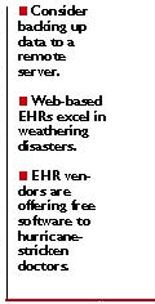Article
Technology Consult
Not sold on EHRs? Think Katrina and Rita

She had been a patient at the Ochsner Clinic Foundation in New Orleans, where she had received a battery of tests to determine whether she was a good candidate for surgery. Forced out of the city by Katrina and not having heard about the test results, she visited an Ochsner regional office in Baton Rouge where Brooks worked.
"She thought she'd have to repeat all her tests because she assumed that her records had been destroyed," says Brooks. "She cried in relief when she discovered that they were online. It turned out that she was a good candidate for surgery, and the operation was a success."
In contrast, the sorry limits of paper were on full display in the wake of Katrina, as well as Hurricane Rita that followed. "I treated evacuees who weren't with Ochsner, so I went without a chart," says Brooks. "I'd ask, 'What kind of cancer do you have?' and they'd reply, 'I don't know.' They didn't know the names of their medications. And it wasn't just ignorant or poor people who were in the dark."
Meanwhile, doctors like New Orleans internist David Myers realized just how vulnerable paper records can be. Floodwaters rose 5 feet in his office, sparing the thousand or so charts above the water line, but ruining those below it. "When I left the city, I didn't take the charts with me because I didn't have enough room in my car," says Myers, adding that he didn't expect the severe flooding that occurred.
If Myers had been a digital doctor, he could have copied his records on a tape, CD, or Zip disk and slipped that in his pocket before he drove off. As it is, his waterlogged charts will be incinerated. Other doctors, like FP Regina Benjamin in hard-hit Bayou La Batre, AL, managed to dry thousands of soaked paper charts in the sun. "I wish I had had an EHR," says Benjamin, "but I couldn't afford one."
How patient data sat high and dry
Strategies for preserving electronic records are more sophisticated than Alabama sunshine. Doctors can back up data files not only on a tape or disk, but also on another computer hundreds or thousands of miles away, safely out of the path of hurricanes and floods. Some practices do such remote backups on a daily basis. Hurricane Rita prompted 19-doctor Southeast Texas Medical Associates in Beaumont to resort to this strategy in ad lib fashion.
Two days before Rita made landfall, the Beaumont practice's IT department set up a server in a Dallas hotel room. There, they backed up data from clinic computers over the Internet until Rita struck and the network shut down. When clinic offices began to reopen approximately a week later, the computer system came back on as if nothing had happened, thanks to the Dallas backup. That wouldn't have been possible, though, if the IT people had saved only patient data, says group CEO and FP James Holly.





